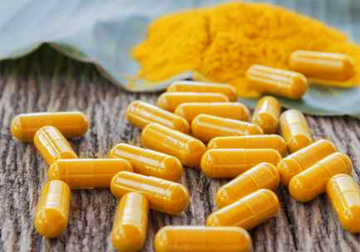
Turmeric, the bright orange cousin of ginger, has graduated from colorful spice in Indian cuisine to widely recognized super food.Turmeric is the powdered rhizome of a tropical plant and 90% of the world’s supply comes from India. (1)
Its exceptional brilliant color makes turmeric a favorite for adding visual appeal to foods, for ceremonies and dyes. The common spice blend known as curry powder gets its color from turmeric. But turmeric is so much more!
Known in scientific circles as curcumin to treat everything from skin and stomach ailments to infections and inflammations. Other research shows it’s helpful to help reduce Alzheimer’s. Now modern researchers have been intrigued enough to put turmeric’s many historical benefits to the test – even rheumatoid arthritis! (1,2)
Treat Rheumatoid Arthritis with the Natural Healing Effects of Turmeric
A study reported in the Phytotherapy Research revealed that curcumin in high bioavailable form have been shown to be more effective than any rheumatoid drugs, which includes reducing tenderness and swelling of the joints, plus patients reported a higher rate of improvement altogether. (3,4)
Along with the amazing benefits and incredible improvements in relieving pain far better than other drugs, patients also reported no side effects. In comparison with patients receiving NSAIDs, about 14% of them experienced side effects. (3)
Researchers explained, “Interestingly, the curcumin group showed the highest percentage of improvement… and these scores were significantly better than the patients in the diclofenac sodium [Voltaren] group. More importantly, curcumin treatment was found to be safe and did not relate with any adverse events. Our study provides the first evidence for the safety and superiority of curcumin treatment in patients with active RA.” (4)
High in potent anti-inflammatory properties
Several years ago, in 2006, another study revealed that turmeric supplements greatly lessened inflammation and destruction in the joints in a way that it blocked inflammatory pathways and prevented increased protein production that causes swelling and pain. (5)
Curcumin has also been shown to influence hundreds of genes and has the ability to inhibit overactivity of COX2 and 5-LOX, as well as other enzymes that has been known to trigger inflammation. (5)
Naturally safe
When looking at the long term effects of NSAIDs and herbal studies, NSAIDs have been deemed to be much more dangerous and damaging to the gastrointestinal, kidney, and cardiovascular systems. Whereas in herbal remedies, the long term treatment for pain and even toxicity have been far safer than NSAIDs. (6)
Consider cooking more foods with the natural root of turmeric or find good quality supplements that will maximize the benefits. It’s easily accessibly and safer. It’s also delicious if you use the fresh turmeric root in your dishes!
Source:
therawfoodworld.com, Treat Rheumatoid Arthritis with the Natural Healing Effects of Turmeric, by Heather Suhr
References:
(1) www.cancer.org
(2) www.dailymail.co.uk
(3) articles.mercola.com
(4) onlinelibrary.wiley.com
(5) onlinelibrary.wiley.com
(6) www.medicinehunter.com
Turmeric may be the answer to treating Alzheimer’s disease
A new study has recently revealed that curcumin, a natural product found in turmeric, may hold the key to treat Alzheimer’s disease. The study indicated that a close

chemical analog of curcumin has properties that may make it useful as a treatment for the brain disease.
Wellington Pham, Ph.D., said that it has demonstrated ability to enter the brain, bind and destroy the beta-amyloid plaques present in Alzheimer’s with reduced toxicity accumulation and aggregation of protein fragments, known as beta-amyloid, drives the irreversible loss of neurons in Alzheimer’s disease.
Developing small molecules to reduce this accumulation or promote its demolition was crucial, but the ability of these small molecules to cross the blood-brain barrier has been a restricting factor for drug delivery into the brain.
Pham and colleagues at Shiga University of Medical Science in Otsu, Japan, developed a new strategy to deliver a molecule similar to curcumin more effectively to the brain.
To work around the problems of giving the drug intravenously, the researchers decided to develop an atomizer to generate a curcumin aerosol. The Japanese researchers developed a molecule similar to curcumin, FMeC1, which was the one actually used in this study. The study is published in the Journal of Alzheimer’s Disease.
Source: DNAIndia.com
The Spice That Could Cure All Your Fears & Bad Memories
Tired of reliving the horrors of your past? Don’t worry, there is a cure.
According to a recent study published in medical journal Neuropsychopharmacology, the possible treatment for Post Traumatic Stress Disorder, or PTSD, might be
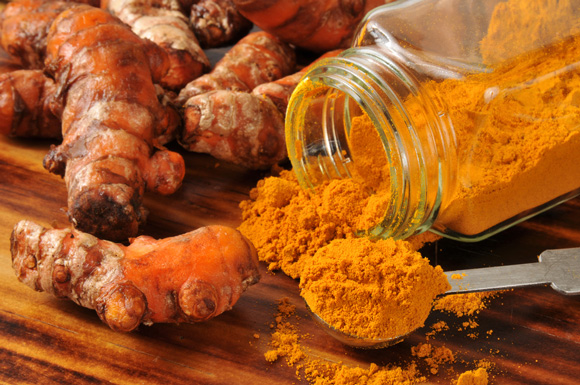
present in your kitchen cabinet.
Commonly used as a curry ingredient, curcumin (a compound found in turmeric) has been found to possess the power to impair newly acquired and reactivated fear memories. The spice is vastly acknowledged for its medicinal properties, and contains anti-inflammatory bodies which are known to help with arthritis and stomach issues, among many other ailments.
After conducting various sets of rat experiments, researchers at Hunter College and the Graduate Center at the City University of New York may have found a way to protect your brain against bad and fear memories, and treat PTSD.
During the experiment, researchers fed rats with curcumin-enriched diet and then evoked fear in them by playing music and shocking their feet. Later, the researchers removed the subjects’ brains and studied them. In another experiment, memory retrieval tests were performed on these rats. The results showed the rats that ate curcumin-laced food had a hard time retrieving the fear memories.
Since human brains are far more complex than that of rats, researchers are devising a plan to test human subjects next. They are hopeful that this might be a breakthrough in the field of neuroscience. If this spice seems to have the same result on humans, it could possibly treat various neurodegenerative disorders.
The study was led and co-authored by Dr. Glenn Schafe, a psychology professor at Hunter College.
“We observed that fear memories that fail to reconsolidate under the influence of dietary curcumin are impaired in an enduring manner; unlike extinguished fear memories they are not subject to reinstatement or renewal,” he stated in the abstract of his study. “Collectively, our findings indicate that a diet enriched with curcumin is capable of impairing fear memory consolidation and reconsolidation processes, findings which may have important clinical implications for the treatment of disorders such as PTSD.”
Source: Carbonated.TV
Curcumin equals exercise in its ability to prevent aging
posted in: Turmeric & Curcumin
A chemical that naturally occurs in turmeric root appears to protect the heart from aging as much as moderate aerobic exercise, according to a trio of studies
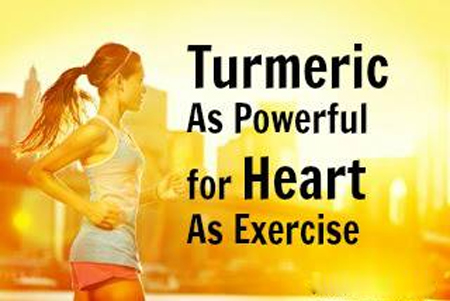
conducted by researchers from the University of Tsukuba in Japan.
Turmeric root has been an important component of traditional Asian medicinal systems for hundreds of years. In recent decades, scientific studies have confirmed the potent anti-inflammatory and antioxidant properties of the trio of turmeric chemicals known as “curcuminoids,” which give the root its distinctive yellow-orange color. Although only one of these chemicals is properly known as “curcumin,” the name is commonly used to refer to all of them collectively.
The three new studies all compared the effects of exercise and curcumin on heart health and postmenopausal women over an eight-week period. All the studies were randomized, double-blind and placebo-controlled. Curcumin was delivered by means of colloidal nanoparticles.
Can turmeric prevent heart disease?
In the first study, researchers assigned 32 women to either take a curcumin supplement, engage in moderate aerobic exercise training, or undergo no intervention at all. The researchers measured participants’ vascular endothelial function – the responsiveness of the layer of cells that line the blood vessels, a key indicator of overall cardiovascular health – both at the beginning and end of the study. They found that while there was no improvement in the control group, endothelial function significantly increased in both the exercise and curcumin groups. Most surprisingly, the improvement in the two experimental groups was identical.
The second study examined curcumin’s effects on the responsiveness of arteries to changes in blood pressure (“arterial compliance”), another key measure of cardiovascular health. In this study, 32 women were randomly assigned to receive either a curcumin supplement or a placebo pill, or to undergo an exercise routine plus either a curcumin or placebo pill. The researchers found no significant improvement in the control group, significant (and equivalent) improvements in both the exercise-only and curcumin-only groups, and the greatest improvement among participants who exercised and also took the supplements.
In the final study, researchers examined the effects of exercise and curcumin on the rate of age-related degeneration of the heart’s left ventricle. 45 participants were randomly assigned into one of the same four groups used in the second study.
The researchers once again found that both exercise and curcumin produced significant increases in heart health. In this study; however, curcumin alone did not appear to provide any benefit. Specifically, brachial systolic blood pressure (SBP) decreased among participants who exercised, whether or not they took curcumin. In addition, heart-rate-corrected aortic augmentation index (AIx) and aortic SBP both decreased significantly only among participants who both exercised and took curcumin.
“Regular ingestion of curcumin could be a preventive measure against cardiovascular disease in postmenopausal women,” the authors of the first study wrote. “Furthermore, our results suggest that curcumin may be a potential alternative … for patients who are unable to exercise.”
Curcumin is best absorbed from turmeric root, rather than from supplements.
Source:Turmeric equals exercise in its ability to prevent aging. By: David Gutierrez. Natural News
Science Reveals Amazing Uses for Ancient Spice Curcumin
For nearly 4,000 years, the intense yellow spice turmeric has been prized in India for both its flavor and its medicinal properties. From India it spread throughout the
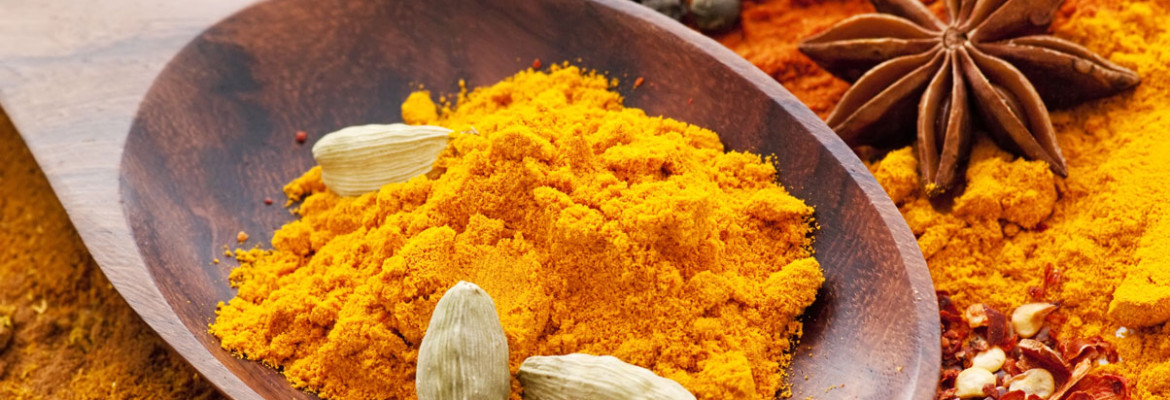
ancient world, to China, Africa and, in the 18th century, the West Indies.
Wherever it went, turmeric was adopted into the local cuisine. Americans might know it best as the yellow spice in common mustard. It also is the spice that gives curry powder its distinctive taste and yellow color.
Traditional healers have employed turmeric for an extraordinary range of complaints. It often is used to improve digestion and eliminate parasites. Topically, turmeric pastes have been applied to cleanse wounds and stimulate healing. Many people take turmeric orally to ease inflammation and pain.
One reader shared this report: “I started using one teaspoon of turmeric in my scrambled eggs each morning. My arthritis has greatly improved, and I have far less pain when I walk.”
Despite its lengthy history, it is only within the past few decades that medical scientists have begun paying close attention to turmeric and its constituents curcumin and the curcuminoids. Animal research confirms that curcumin can alleviate arthritis induced experimentally (European Journal of Pain online, Nov. 17). A small placebo-controlled trial in people with osteoarthritis of the knee found curcumin produced measurably better relief than the placebo (Phytotherapy Research, November).
Laboratory studies indicate turmeric has strong antioxidant properties and also could serve as a valuable anti-inflammatory and antimicrobial compound. In addition, tissue-culture studies suggest constituents of turmeric are active against leukemia cells and can nudge them to die a natural death.
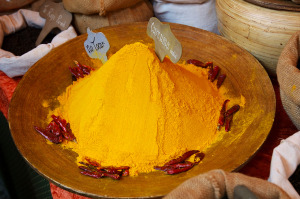
Turmeric has several anti- cancer effects and is active against cells from tumors of the colon, stomach, skin, breast, prostate and pancreas (BioMed Research International online, Sept. 10. It also seems useful against a number of experimental cancers in animals, ranging from skin cancer to tumors of the lung, breast and stomach.
Turmeric and presumably curcumin can trigger adverse reactions. Some people are allergic to this plant product and break out in a rash. Those who are on the anticoagulant warfarin (Coumadin) should not use turmeric as it could increase the risk of excessive bleeding.
Turmeric and curcumin are among the more exciting natural products under investigation. Future research might show benefits against metabolic syndrome, heart disease and Alzheimer’s disease.
Joe Graedon is a pharmacologist. Teresa Graedon holds a doctorate in medical anthropology and is a
nutrition expert.
Source: Joe Graedon, M.S., and Teresa Graedon, Ph.D. King Features Syndicate. The Gazette
Turmeric’s Ability to Treat Disease
New study finds Turmeric to be as effective for treating disease as 14 different conventional drugs.
It’s no secret that turmeric has amazing healing properties; in fact, it’s one of the most thoroughly researched plants in history. Dating back thousands of years, humans have used turmeric as both a food and a medicine, even using it to cure life-threatening diseases.
Researchers at GreenMedInfo, an organization dedicated to providing evidence-based resources to the world, found turmeric to have over 600 potential preventive and therapeutic applications and 175 distinct beneficial physiological effects. Click here for a downloadable PDF of medically researched data regarding turmeric.
Turmeric is an ancient spice traditionally used in India that gives curry its yellow color. It not only is tasty but contains highly effective compounds with medicinal properties. The most beneficial compound in turmeric is curcumin, which is also its most active ingredient, offering strong anti-inflammatory and antioxidant effects.
A research project conducted by GreenMedInfo found that turmeric is capable of replacing a variety of conventional medications designed to treat various conditions including plaque build-up in arteries, inflammation and oxidative stress in type 2 diabetes, inflammatory eye disease, depression, arthritis and many more.
It’s been proven to be a common replacement for aspirin or ibuprofen, offering pain-fighting and anti-inflammatory abilities in a more natural way.
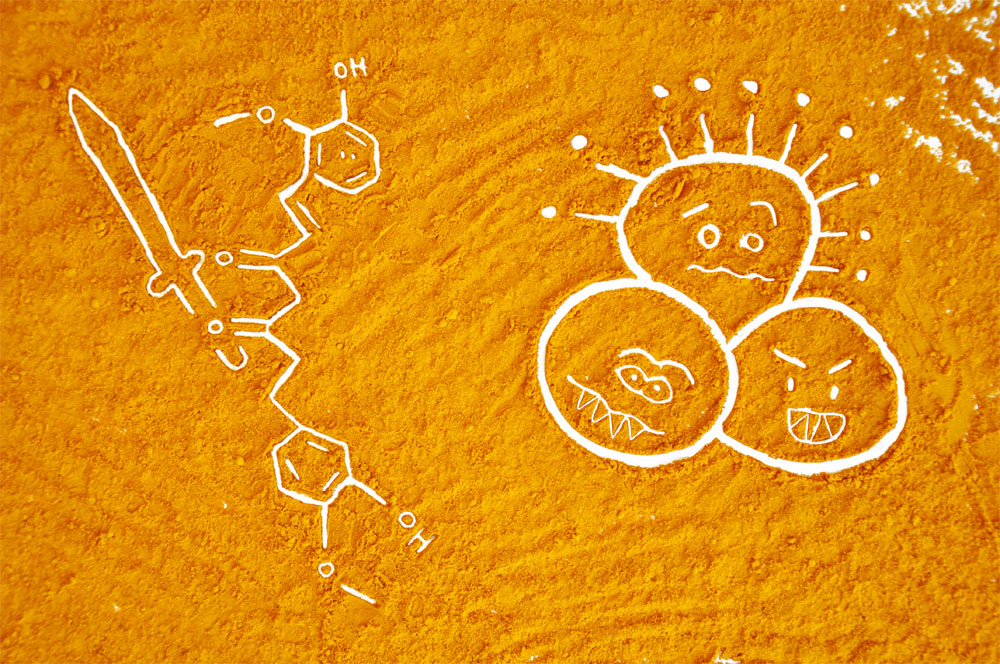
Below are the conventional medications that GreenMedInfo found turmeric could either replace or supplement:
Lipitor/Atorvastatin (cholesterol medication): A 2008 study published in the journal Drugs in R & D discovered that curcuminoids, found in turmeric, can be used to treat endothelial dysfunction, a condition affecting the functionality of blood vessels. Researchers also believe that curcumin can help treat inflammation and oxidative stress in type 2 diabetic patients.
Corticosteroids (steroid medications): A 1999 study published in the journal Phytotherapy Research found that curcumin can treat chronic anterior uveitis, an inflammatory eye disease, similar to the way steroids are used, but in a safer, healthier fashion.
Another study found that curcumin can act as an alternative therapy for protecting lung-transplantation-associated injury, working similarly to the corticosteroid drug dexamethasone, but without the side effects.
Prozac/Fluoxetine & Imipramine (antidepressants): A 2011 study published in the journal Acta Poloniae Pharmaceutica found that curcumin worked in treating depression, potentially capable of replacing psychotropic drugs like Prozac.
Aspirin (blood thinner): A 1986 study published in the journal Arzneimittelforschung (Drug Research) found that curcumin has “anti-platelet and prostacyclin modulating effects compared to aspirin,” and might be capable of treating patients prone to blood clots and requiring anti-arthritis therapy.
Anti-inflammatory Drugs: A 2004 study published in the journal Oncogene found curcumin to be an effective alternative to drugs like aspirin, ibuorofen, anti-inflammatory pharmaceuticals and tumor-cell-fighting medications.
Oxaliplatin (chemotherapy drug): A 2007 study published in the International Journal of Cancer discovered that curcumin could be used to treat colon cancer, potentially replacing oxaliplatin.
Metformin (diabetes drug): A 2009 study published in the journal Biochemical and Biophysical Research Communications found that curcumin might be valuable in treating diabetes and increasing glucose uptake. Researchers think that it may also be capable of suppressing glucose production in the liver in patients with hepatocellular carcinoma, one of the most common cancers worldwide.
Scientists found curcumin to be 500 times to 100,000 times more potent than the diabetes drug metformin.
Overall, the benefits of Turmeric are quite amazing. It’s no wonder its been used by humans for thousands of years. If you decide to take supplements containing curcumin extract, be sure to consume it with black pepper containing piperine, an all natural substance that helps with curcumin absorption.
Because curcumin is fat soluble, it also helps to take it with a fatty meal.
Source: Natural News, Turmeric as effective for treating disease as 14 different conventional drugs, study finds. By Julie Wilson